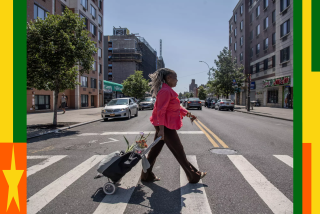Army takes police off duty in 3 Mexican towns
Local police were relieved of duty Tuesday in the border cities of Nuevo Laredo, Matamoros and Reynosa as army troops disarmed the officers and searched for evidence that might link them to drug traffickers.
In Nuevo Laredo, soldiers surrounded police headquarters at 8 a.m. and ordered officers to remain inside. Federal troops conducted a similar operation in Tijuana last January, at the beginning of an offensive against Mexico’s drug cartels and their allies in the police.
During the first 14 months of his rule, President Felipe Calderon has sent federal troops to at least half a dozen states, including Michoacan in the south and Veracruz on the Gulf. Calderon has vowed to break the power of the traffickers, who wield wide influence over local authorities and intimidate local news media.
At least two drug-trafficking organizations are fighting for control of Nuevo Laredo and its border crossings, a lucrative source of income for smugglers. President Vicente Fox, Calderon’s predecessor, sent army troops there in 2005.
But the violence has continued unabated. Several observers in Nuevo Laredo say it is an open secret that many police officers cooperate with traffickers.
In an interview this month with the Spanish newspaper El Pais, Atty. Gen. Eduardo Medina Mora acknowledged that the Calderon government’s purges of federal, state and local police were only the beginning.
“There are municipal police forces that have collapsed and that function more as support staff to organized crime rather than as guardians of public safety,” Medina Mora said.
Last week, federal police arrested 11 men in Nuevo Laredo, including four police officers, who were said to be operatives for the so-called Gulf cartel.
On Tuesday, all on-duty police officers were confined to their stations and none patrolled the city, according to news reports. About 300 troops of the army’s elite Airborne Special Forces Group established checkpoints throughout the city.
“This is an action that is taking place with the full cooperation of the mayor,” said Alberto Rodriguez, a spokesman for the Nuevo Laredo city government.
Mexican military officials said the army would patrol the city with the assistance of state and federal police but declined to comment further.
In Matamoros, 600 police officers were confined to stations and were being questioned by federal authorities, according to media reports.
The similar operation last year in Tijuana lasted three weeks, with more than 3,500 soldiers and federal agents sent into the city. Many police patrolled unarmed, and a few were seen with slingshots until their weapons were returned.
In the months since, violence there related to drug trafficking and organized crime has continued unabated.
At least 17 people were killed in the border city last week, including three senior police officials, one of whom was shot in his home alongside his wife and two daughters.
Federal officials have said privately that many of their most recent shootouts have been with operatives of the Gulf cartel, based in the state of Tamaulipas, which includes Nuevo Laredo, Reynosa and Matamoros. The cartel has been the most aggressive in efforts to conquer territory from rivals, officials say.
Army special forces troops Tuesday confiscated two dozen assault rifles in a Reynosa “safe house” said to belong to the Gulf cartel and its band of hit men, the Zetas.
A day earlier, federal agents arrested Alfredo Beltran Leyva, allegedly a leader in the so-called Sinaloa cartel, also known as the cartel of the Pacific. And 11 suspected hit men allegedly linked to Beltran Leyva were arrested Tuesday in two mansions on the southern edge of Mexico City.
The suspected cartel operatives were lined up in the living rooms of the two homes. Federal drug officials presented the men to local reporters alongside a small arsenal of seized weapons, including machine guns and grenades.
--
--
Cecilia Sanchez of The Times’ Mexico City Bureau contributed to this report.
More to Read
Start your day right
Sign up for Essential California for news, features and recommendations from the L.A. Times and beyond in your inbox six days a week.
You may occasionally receive promotional content from the Los Angeles Times.







